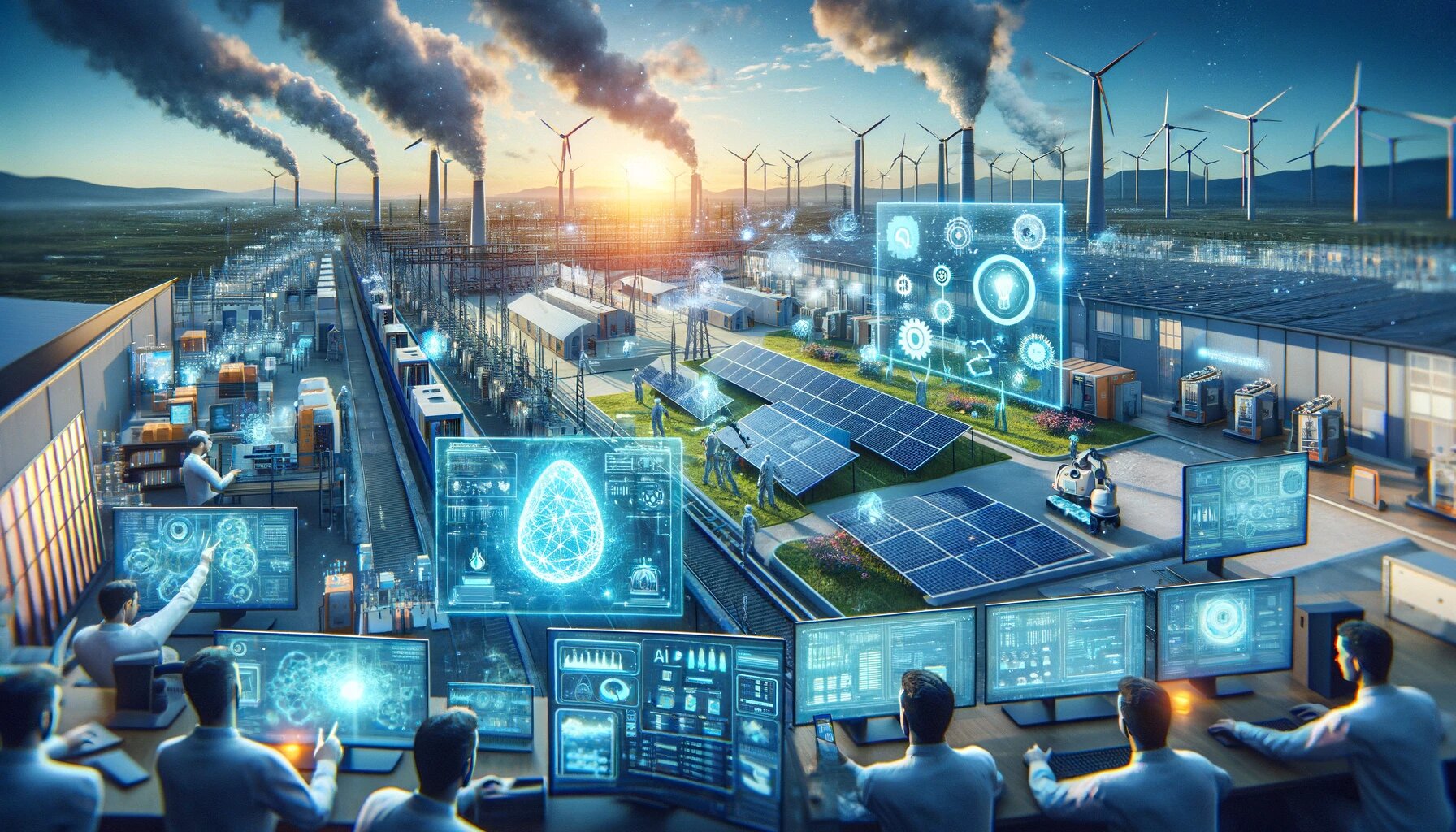In today’s rapidly changing world, the efficient use of energy resources is becoming increasingly crucial. As concerns about climate change and environmental sustainability grow, there is a growing demand for innovative solutions to reduce energy consumption and minimize waste. Artificial Intelligence (AI) has emerged as a powerful tool in this effort, offering the potential to revolutionize the way we manage and optimize energy usage. This article explores the role of AI in enhancing energy efficiency, highlighting its various applications and benefits.
Introduction to Energy Efficiency and Its Importance
Energy efficiency refers to the utilization of less energy to perform the same task or achieve the same outcome. It is a critical aspect of sustainability, as it helps reduce greenhouse gas emissions, lower energy costs, and decrease reliance on finite energy resources. Energy efficiency initiatives aim to improve the performance of various sectors, including industrial processes, transportation, and residential buildings. However, achieving significant gains in energy efficiency can be challenging without advanced technologies like AI.
Harnessing AI for Energy Management
Artificial Intelligence has emerged as a game-changer in the field of energy management. Its ability to process vast amounts of data, analyze patterns, and make real-time decisions has made it an invaluable tool for enhancing energy efficiency. Here are some of the key ways AI is being utilized to optimize energy usage:
Predictive Maintenance
One of the major applications of AI in energy efficiency is predictive maintenance. AI algorithms can analyze data from sensors and monitoring devices to predict when equipment, such as motors or HVAC systems, is likely to fail. Organizations can proactively schedule maintenance activities by identifying potential issues before they occur, preventing costly breakdowns, and ensuring that equipment operates at peak efficiency.
Demand Response
AI-driven demand response programs enable utilities and consumers to manage their electricity consumption more efficiently. These systems analyze real-time data on energy demand and pricing to automatically adjust power usage in response to fluctuations in supply and cost. For example, during periods of high demand or peak pricing, AI can instruct smart appliances and industrial processes to reduce energy consumption, helping to alleviate stress on the grid and reduce energy bills.
Smart Grids
AI plays a crucial role in the development of smart grids, which are modernized electrical grids that incorporate digital technology and two-way communication. Smart grids enable better monitoring and control of energy distribution, allowing utilities to balance supply and demand more effectively. AI algorithms help detect and respond to power outages, optimize grid operations, and integrate renewable energy sources seamlessly.
Energy-Efficient Buildings
In the realm of construction and building management, AI is used to design and operate energy-efficient buildings. AI-driven building management systems can adjust lighting, heating, and cooling in real time based on occupancy, weather conditions, and energy pricing. These systems optimize energy usage, reduce waste, and provide comfortable environments for occupants.
Renewable Energy Integration
The integration of renewable energy sources, such as solar and wind power, into the energy grid presents challenges due to their intermittent nature. AI can help forecast renewable energy generation, predict energy demand, and optimize the distribution of renewable energy to the grid. This enables a smoother transition to cleaner energy sources and reduces the need for backup fossil fuel power generation.
Benefits of AI in Enhancing Energy Efficiency
The adoption of AI in energy management offers numerous benefits that extend to individuals and society. Here are some of the advantages:
1. Reduced Energy Costs
By optimizing energy consumption and reducing waste, AI can lead to significant cost savings for consumers and businesses. This is especially important in industries with high energy demands, such as manufacturing and data centers, where even small efficiency improvements can translate into substantial financial benefits.
2. Lower Carbon Emissions
Enhanced energy efficiency results in reduced greenhouse gas emissions, contributing to efforts to combat climate change. AI-driven solutions can help countries meet their emissions reduction targets and transition to more sustainable energy sources.
3. Improved Reliability
Predictive maintenance powered by AI helps prevent unexpected equipment failures, leading to increased reliability and reduced downtime. This is particularly valuable in industries where equipment reliability is critical, such as healthcare, transportation, and manufacturing.
4. Enhanced Grid Resilience
Smart grids equipped with AI can respond more effectively to disruptions caused by natural disasters or cyberattacks. This resilience is vital for ensuring a stable and secure energy supply.
5. Job Creation
The implementation of AI in the energy sector can create job opportunities in areas such as data analysis, software development, and system maintenance. This can contribute to economic growth and workforce development.
Challenges and Considerations
While AI holds great promise for enhancing energy efficiency, there are several challenges and considerations that must be addressed:
1. Data Privacy and Security
The collection and analysis of vast amounts of data in energy systems raise concerns about data privacy and security. Protecting sensitive information and ensuring the integrity of AI systems are critical.
2. Integration and Compatibility
Integrating AI solutions into existing energy infrastructure can be complex and costly. Ensuring compatibility and smooth transition is essential for successful implementation.
3. Accessibility and Equity
AI-driven energy solutions should be accessible to all, and efforts must be made to ensure that vulnerable populations do not disproportionately bear the costs or miss out on the benefits of these technologies.
4. Ethical Considerations
AI algorithms should be designed and used ethically, taking into account potential biases and unintended consequences. Fair and equitable energy distribution should be a priority.
The Future of AI-Enhanced Energy Efficiency
As we look ahead to the future, the role of AI in enhancing energy efficiency is poised to expand and evolve, bringing with it exciting possibilities for a more sustainable and environmentally conscious world. Here are some key insights into what the future may hold for AI-powered energy efficiency:
- Advanced Predictive Analytics: AI algorithms will become even more sophisticated in predicting equipment failures and optimizing energy consumption. With the integration of machine learning and deep learning techniques, these systems will continuously improve their accuracy and efficiency, ultimately resulting in reduced downtime and energy waste.
- Autonomous Energy Management: The future will see greater automation in energy management. Smart homes and buildings will autonomously adjust lighting, heating, and cooling based on occupants’ preferences and real-time energy pricing, making energy efficiency seamless and effortless for consumers.
- Energy Storage Optimization: AI will play a pivotal role in optimizing energy storage solutions such as batteries. It will enable more efficient charging and discharging, extending the life of energy storage systems and improving their overall effectiveness in supporting renewable energy integration.
- Cross-Sector Integration: AI’s reach will extend beyond individual sectors, facilitating cross-sector integration. For example, AI systems will optimize the interaction between transportation and energy grids, leading to more efficient public transportation networks and reduced energy consumption in urban areas.
- Policy and Regulation Support: Governments and regulatory bodies will increasingly rely on AI to monitor and enforce energy policies. AI can provide real-time insights into energy consumption, emissions, and compliance, helping policymakers make informed decisions to achieve environmental and energy goals.
- Emerging Technologies: Quantum computing and neuromorphic computing hold the potential to revolutionize AI’s capabilities in energy efficiency. These technologies may unlock new avenues for solving complex energy optimization problems and further accelerate the transition to clean and sustainable energy sources.
Ultimately, the future of AI-enhanced energy efficiency promises a more sustainable and environmentally friendly world. As AI technologies continue to advance and integrate into various aspects of our lives, they will play a central role in optimizing energy usage, reducing waste, and supporting the global transition to cleaner and more efficient energy systems. With innovation and collaboration, we can look forward to a future where AI and energy efficiency go hand in hand in shaping a brighter, greener tomorrow.
Conclusion
Artificial Intelligence is poised to play a significant role in enhancing energy efficiency across various sectors. Its ability to predict equipment failures, manage demand, optimize grids, and integrate renewable energy sources makes it a valuable tool in the pursuit of sustainable and environmentally friendly energy practices. While challenges and considerations exist, the potential benefits, including cost savings, reduced emissions, improved reliability, and job creation, make the integration of AI into energy management an exciting and promising endeavor for a more sustainable future. As technology continues to advance, we can expect even greater innovations and improvements in the field of energy efficiency through the power of AI.

